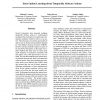1276 search results - page 56 / 256 » Modeling of Process-Oriented Learning Designs |
117
Voted
IJCAI
2001
15 years 3 months ago
2001
Software design is the hardest part of creating intelligent agents. Therefore agent architectures should be optimized as design tools. This paper presents an architectural synthes...
117
Voted
ICML
1998
IEEE
16 years 3 months ago
1998
IEEE
tion Learning about Temporally Abstract Actions Richard S. Sutton Department of Computer Science University of Massachusetts Amherst, MA 01003-4610 rich@cs.umass.edu Doina Precup D...
116
click to vote
SIGCSE
2002
ACM
15 years 2 months ago
2002
ACM
Designing a two-person game involves identifying the game model to compute the best moves, the user interface (the "view") to play the game, and the controller to coordi...
112
Voted
IM
2007
15 years 4 months ago
2007
— The objectives of this paper are twofold. First, we introduce a novel policy language, called CIM-SPL (Simple Policy Language for CIM) that complies with the CIM (Common Inform...
137
Voted
FUIN
2008
15 years 1 months ago
2008
Causal relations are present in many application domains. Causal Probabilistic Logic (CP-logic) is a probabilistic modeling language that is especially designed to express such rel...


